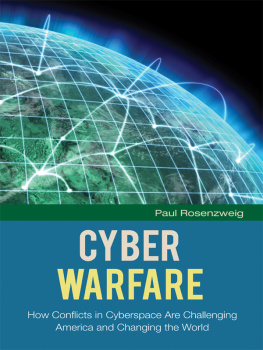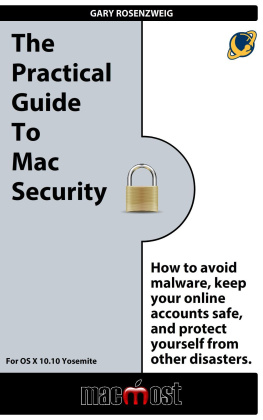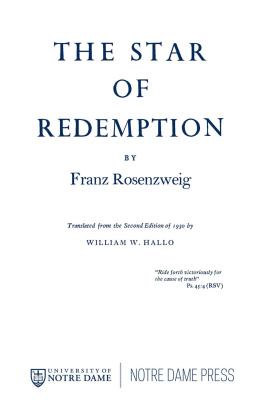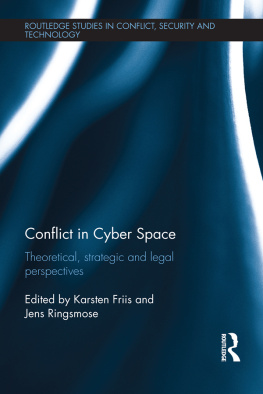PAUL ROSENZWEIG is the founder of Red Branch Consulting PLLC, a homeland security consulting company, and a senior advisor to The Chertoff Group. Rosenzweig formerly served as Deputy Assistant Secretary for Policy in the Department of Homeland Security. He also serves as a professorial lecturer in law at George Washington University, a senior editor of the Journal of National Security Law & Policy, and a visiting fellow at The Heritage Foundation. In 2011 he was a Carnegie Visiting Fellow at the Medill School of Journalism, Northwestern University.
Acknowledgments
There are a number of people to thank for their help in making this book possible. Certainly, if victory has many parents, then a successful book can only be seen as a victory, with many who deserve thanks for its success.
To begin with, I offer my thanks to Jack Goldsmith of Harvard for the idea for this book. We were talking one day at a seminar in Montana and he suggested the need for a comprehensive survey of this sort. Thanks, too, to Greg Maggs and Peter Raven-Hansen of George Washington University School of Law. They hired me to develop and teach a course on cybersecurity law and policy and the research that went into the course formed the basis of much of this book. I owe them, along with Dean Paul Berman, a deep debt of gratitude for giving me an intellectual home at George Washington.
Thanks, also, to Angie Chen who teaches a technology and policy course at George Mason Universityshe loaned me her syllabus from that course and that was my starter material for the course I eventually taught.
I owe a special debt of gratitude to my friend, James Carafano, of The Heritage Foundation. Jim and I wrote a book together a few years ago and he is the series editor of this Praeger series. It was at Jim's urging that I first tried to pull the syllabus into a book proposal format and submit it. Heritage, as well, has been an intellectual home for me over the years and I am deeply grateful to the foundation for its support. Thanks, as well, to Steve Catalano, the acquisitions editor at Praeger, who saw something in the proposal and helped me shepherd it through the approval process. Without either of them, this book would not exist.
Particular thanks must go to the Medill School of Journalism, at Northwestern University, and my colleagues Tim McNulty, Ellen Shearer, Scott Anderson, Josh Meyers, Janice Castro, and Mary Nesbitt. I spent a joyous six months there as a Carnegie Visiting Fellow during 2011. Much of the research for this volume was done while I was in residence there, and I am grateful to them for giving me an academic home from which to work. My especial gratitude to the Carnegie Corporation which funded my Fellowship.
Thanks, as well, to my students at George Washington and Northwestern, who suffered through my development of the seminar and whose own research papers and interests have contributed to my education. One of my students, Brock Dahl, provided helpful comments on some of the early chapters.
There are a number of colleagues (other than those already mentioned) from whom, over the years, I have learned a great deal. Some of the best ideas in this book are ones I first had the chance to discuss with one of them, and I have benefited from innumerable conversations. In alphabetical order, I express an intellectual debt to: Michael Aisenberg, Ken Anderson, William Banks, M.E. Spike Bowman, Steve Bucci, Robert Chesney, Paul Clark, Raphael Cohen-Almagor, Jim Dempsey, Steven Dycus, Jayson Healey, Lance Hoffman, Adam Isles, Jeff Jonas, Orin Kerr, John Kropf, Harvey Rishikof, Marcus Sachs, Nathan Sales, Daniel Solove, Jay Stanley, K.A. Taipale, Matthew Waxman, and Benjamin Wittes.
I must also specifically mention a nonattribution e-mail group of which I am a memberThe Cyber Loopand thank my fellow Loopers for all they've done to add to my education. Many of the books in the bibliography were first recommended to me by some of them.
Stewart Baker was my boss at the Department of Homeland Security and, in this field, a philosophical guide. Whenever I wonder what the right answer is, I simply ask myself what Stewart will say? And, that usually proves the right answer. And, on those rare occasions when I disagree with him, I always suspect that I'm missing something.
I owe a quick shout-out, as well, to my grandson Aaron Kunzer, who showed me the T-shirt from Think Geek with the binary quote on it that serves as the epigraph of this book. And, I need to thank my parents, Bobbie and Irving Rosenzweig, and my brother Jim for all their love and support over the years. My mother and brother will read this book; I regret that my father did not have the chance to do so before he died.
I have had the opportunity to work with a number of publishers and journal editors over the past two years. Portions of this work have previously appeared in some of those other publications. Grateful acknowledgement is made to the various publications where these works first appeared and, where necessary, for permission to reuse that material in this volume, as follows:
- Making Good Cybersecurity Law and Policy: How Can We Get Tasty Sausage?, 8 Journal of Law and Policy for the Information Society (2012);
- Privacy and Counterterrorism: The Pervasiveness of Data, 42 Case Western Reserve Journal of International Law 625 (2010);
- The Organization of the United States Government and Private Sector for Achieving Cyber Deterrence in Proceedings of a Workshop on Deterring Cyber Attacks: Informing Strategies and Developing Options for U.S. Policy (National Academy of Sciences, 2010), reprinted by the courtesy of the National Academies Press, Washington, DC;
- The Evolution of Wiretapping, Engage (Federalist Society, 2011);
- Cybersecurity: An Introduction, from Worms to Cyberwar and Beware of Cyber China, Defining Ideas (Hoover Institution, 2011 & 2012);
- Cybersecurity and Public Goods: The Public/PrivatePartnership (Hoover Institution, 2011);
- National Security Threats in Cyberspace (American Bar Association & National Strategy Forum 2009), reprinted with permission;
- Einstein 3.0 in Baker & Horowitz, eds., Patriots Debate: Contemporary Issues in National Security Law (ABA Publishing, 2012);
- 10 Conservative Principles for Cybersecurity Policy, The Heritage Foundation, Backgrounder No. 2513 (January 2011);
- Lessons of WikiLeaks: The U.S. Needs a Counterinsurgency Strategy for Cyberspace, The Heritage Foundation, Backgrounder No. 2560 (May 2011); and
- The International Governance Framework for Cybersecurity, 37 Canada-United States Law Journal (2012).
And, finally, of course, I owe a deep debt of gratitude to my wife, Katy Kunzer, who read the entire manuscript and offered her insights throughout. More importantly, her support and love are the foundation of my life and are the true parents of this successful volume.
Bibliography
This bibliography is arranged by general topic area of interest for greater ease of research.
COMPUTERS AND THE INTERNET: GENERALLY
Gleick, James. The Information: A History, A Theory, A Flood. Pantheon, 2011.
Goldsmith, Jack, and Tim Wu. Who Controls the Internet? Illusions of a Borderless World. Oxford University Press, 2006.
Lessig, Lawrence. Code Version 2.0. Basic Books, 2006.
Morozov, Evgeny. The Net Delusion: The Dark Side of Internet Freedom. Public Affairs, 2011.
Post, David G. In Search of Jefferson's Moose: Notes on the State of Cyberspace. Oxford University Press, 2009.
Reid, T.R. How Two Americans Invented the Microchip and Launched a Revolution.












